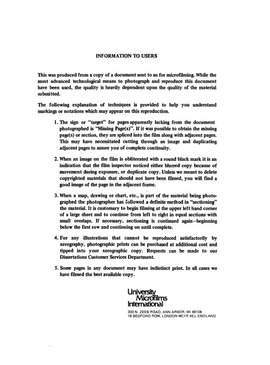| dc.contributor.author | Mousa, Nabeel Ezzat, | en_US |
| dc.date.accessioned | 2013-08-16T12:28:21Z | |
| dc.date.available | 2013-08-16T12:28:21Z | |
| dc.date.issued | 1981 | en_US |
| dc.identifier.uri | https://hdl.handle.net/11244/4870 | |
| dc.description.abstract | Decision-making is the heart of the management process. Decisions are needed for the construction, authorization and operation of all economic, social and political programs in developing countries. Effective decisions cannot be made without adequate information. It was found that the production of information for decision-making is not less important that the production of physical commodities. The production of information is the purpose of MIS. The literature of MIS does not have any reference to developing countries. | en_US |
| dc.description.abstract | First, five conceptual factors of MIS were identified: (1)systems concepts for MIS, (2)human and organizational behavior, (3)decision-making, (4)systems analysis, and (5)information technology. The five factors were found to constitute dimensions of a theory base for MIS which provided essential components of MIS curriculum. | en_US |
| dc.description.abstract | Third, the framework for curriculum planning in developing countries was developed to utilize the theory base for MIS for planning MIS curriculum in developing countries. The third stage of the investigation presented a coherent conceptual framework for planning MIS curriculum in developing countries. This framework consisted of the integration of the first and second stages. | en_US |
| dc.description.abstract | It was found that MIS techniques can be introduced in developing countries through education. This required the development of a conceptual framework for planning MIS curriculum in developing countries. The development of the framework involved three interrelated stages. | en_US |
| dc.description.abstract | This investigation was a library research project which was conducted through the use of written materials obtained from libraries located throughout the United States. The purpose of the investigation was to adapt the different techniques of MIS to the needs of developing countries. | en_US |
| dc.description.abstract | Human resource development was found to be one of the most serious problems which drain human and economic resources of developing countries. An aspect of this problem is the shortage of managerial and administrative skills which represents an inhibiting factor in developing countries. This shortage is due to the lack of the appropriate professional education for management. | en_US |
| dc.description.abstract | Second, environmental and cultural factors influencing curriculum planning were identified. The characteristics that distinguish developing countries in the world were used to determine the major environmental factors influencing curriculum planning in these countries. The major factors were technology and science, employment, and population. Major culture factors which influence curriculum planning were values (the roots of culture) and ideology (the framework for interpreting values). The environmental and cultural factors were used to develop a framework for curriculum planning in developing countries. | en_US |
| dc.format.extent | viii, 182 leaves : | en_US |
| dc.publisher | The University of Oklahoma. | en_US |
| dc.subject | Education, Business. | en_US |
| dc.subject | Education. | en_US |
| dc.title | A conceptual framework for planning management information systems curriculum in developing countries. | en_US |
| dc.type | Thesis | en_US |
| dc.thesis.degree | Ph.D. | en_US |
| dc.note | Source: Dissertation Abstracts International, Volume: 42-02, Section: A, page: 0514. | en_US |
| ou.identifier | (UMI)AAI8116761 | en_US |
| ou.group | Other | |
